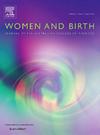前1000天产妇压力和焦虑的可改变和脆弱性因素:总括性审查和框架
IF 4.1
2区 医学
Q1 NURSING
引用次数: 0
摘要
在怀孕期间和产后2年,母亲的压力和焦虑对妇女和儿童的身体健康和心理健康有重要影响。AimAn总体综述综合了与围产期和早期父母压力和焦虑相关的可修改和脆弱性因素,从文献中为未来的干预制定了一个理论上知情的框架。方法检索medline、CINAHL、PsycINFO和妇幼保健数据库,检索时间为建库至2023年9月。所有的系统评价、荟萃分析、定性证据综合、快速评价或范围评价均以孕妇和/或产后2年为重点,并检查与围产期和/或早期生育母亲压力和/或焦虑相关的因素。每篇论文都使用评估系统评价的测量工具(AMSTAR-2)进行审查。社会生态模型和素质应激模型为叙事综合和框架发展提供了信息。研究结果纳入了43篇综述。与母亲压力和焦虑相关的因素在社会生态水平上被确定。现有的心理健康问题和人际因素(如社会支持)是可改变因素的最有力证据。有中度证据表明可改变的因素包括社会规范和耻辱、健康行为和期望。确定的脆弱性因素包括社会人口因素、生活史、孕产妇健康和出生相关因素、人际因素和儿童相关因素。结论在考虑影响应激和焦虑结果的脆弱性因素的同时,在多个生态水平上确定可改变的因素是必要的。在这个总括性审查中制定的理论知情框架可以指导识别和解决这些因素,以减少围产期和早期生育母亲的压力和焦虑。本文章由计算机程序翻译,如有差异,请以英文原文为准。
Modifiable and vulnerability factors for maternal stress and anxiety in the first 1000 days: An umbrella review and framework
Background
Maternal stress and anxiety during pregnancy and up to 2 years postpartum have important implications for the physical health and psychological wellbeing of women and children.
Aim
An umbrella review synthesised the modifiable and vulnerability factors related to perinatal and early parenthood stress and anxiety from the literature to develop a theoretically-informed framework for future interventions.
Methods
MEDLINE, CINAHL, PsycINFO, and Maternity and Infant Care databases were searched from database inception to September 2023. All systematic reviews, meta-analyses, qualitative evidence syntheses, and rapid or scoping reviews that focused on pregnant women and/or up to 2 years postpartum and examined factors associated with perinatal and/or early parenthood maternal stress and/or anxiety were included. Each paper was reviewed using A MeaSurement Tool to Assess systematic Reviews (AMSTAR-2). Narrative synthesis and framework development were informed by the social ecological and diathesis-stress models.
Findings
Forty-three reviews were included. Factors related to maternal stress and anxiety were identified across social-ecological levels. The strongest evidence for modifiable factors was identified for existing mental health issues and interpersonal factors, such as social support. There was moderate evidence for modifiable factors including social norms and stigma, health behaviours, and expectancies. Vulnerability factors identified included sociodemographic factors, life history, maternal health, and birth-related factors, interpersonal factors, and child-related factors.
Conclusion
Addressing identified modifiable factors across multiple ecological levels, with consideration of vulnerability factors that impact on stress and anxiety outcomes is essential. The theoretically informed framework developed in this umbrella review can guide identifying and addressing these factors to reduce perinatal and early parenthood maternal stress and anxiety.
求助全文
通过发布文献求助,成功后即可免费获取论文全文。
去求助
来源期刊

Women and Birth
NURSING-OBSTETRICS & GYNECOLOGY
CiteScore
7.20
自引率
13.20%
发文量
371
审稿时长
27 days
期刊介绍:
Women and Birth is the official journal of the Australian College of Midwives (ACM). It is a midwifery journal that publishes on all matters that affect women and birth, from pre-conceptual counselling, through pregnancy, birth, and the first six weeks postnatal. All papers accepted will draw from and contribute to the relevant contemporary research, policy and/or theoretical literature. We seek research papers, quality assurances papers (with ethical approval) discussion papers, clinical practice papers, case studies and original literature reviews.
Our women-centred focus is inclusive of the family, fetus and newborn, both well and sick, and covers both healthy and complex pregnancies and births. The journal seeks papers that take a woman-centred focus on maternity services, epidemiology, primary health care, reproductive psycho/physiology, midwifery practice, theory, research, education, management and leadership. We also seek relevant papers on maternal mental health and neonatal well-being, natural and complementary therapies, local, national and international policy, management, politics, economics and societal and cultural issues as they affect childbearing women and their families. Topics may include, where appropriate, neonatal care, child and family health, women’s health, related to pregnancy, birth and the postpartum, including lactation. Interprofessional papers relevant to midwifery are welcome. Articles are double blind peer-reviewed, primarily by experts in the field of the submitted work.
 求助内容:
求助内容: 应助结果提醒方式:
应助结果提醒方式:


